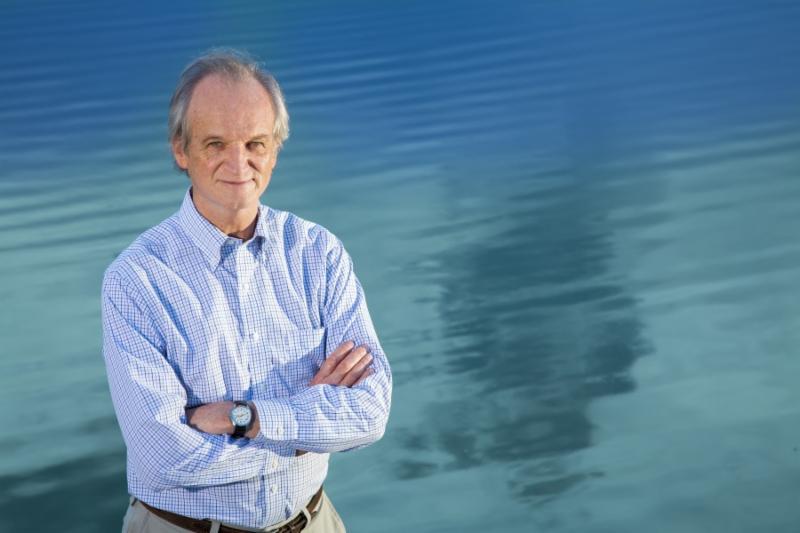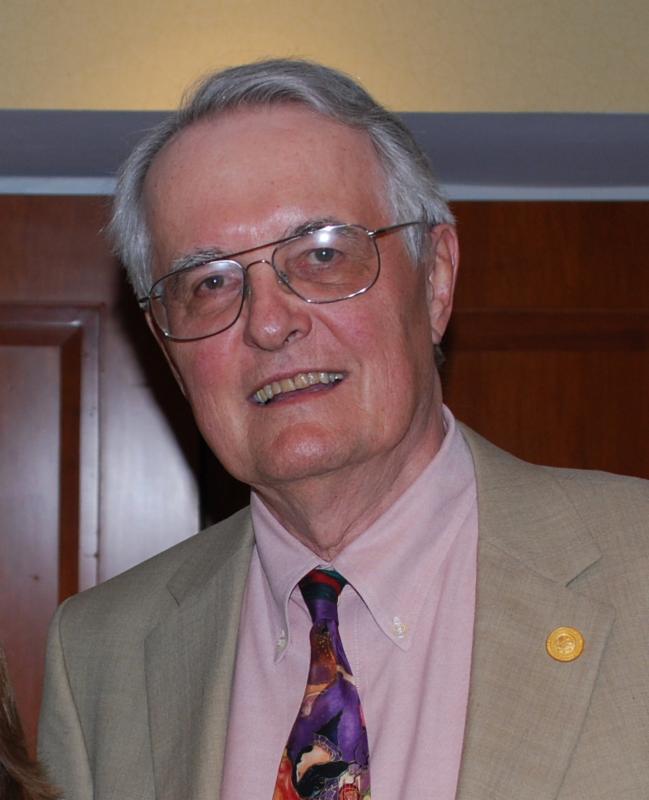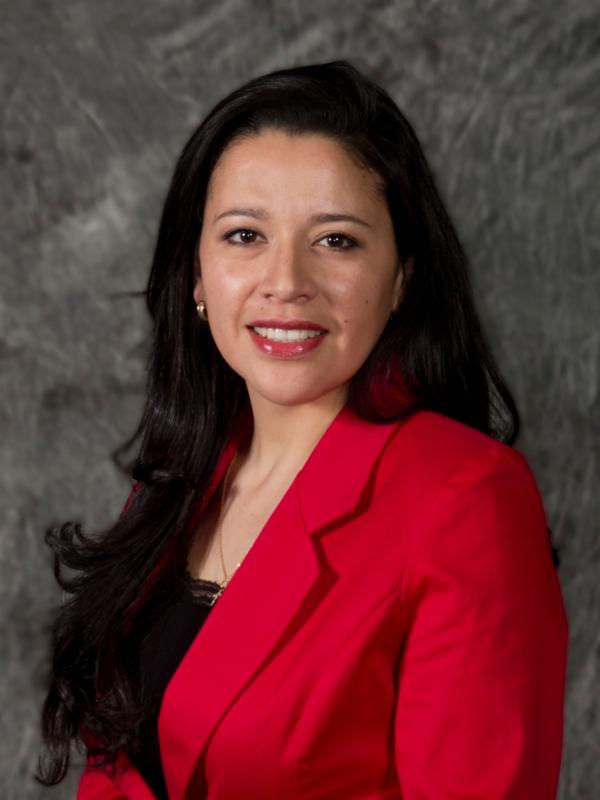|
|
|
|
 |
 |
 |
 |
 |
 |
 |
 |
 |
 |
UNL agronomists spearhead standards for using crop data
|
An international team led by
Water for Food Institute Faculty Fellows from the University of Nebraska-Lincoln has published the first systematic guidelines for using data to more reliably simulate crop yields. "Ultimately, reliable crop yield simulations - at the local, regional and global levels - are needed to better inform policymaking and prioritize agronomic research and development," said Patricio Grassini (pictured). "That's the ultimate goal."
Learn more.
|
Water for Food Institute announces new reports
|
|
|
|
The Water for Food Institute is pleased to introduce, "Nebraska's Natural Resources Districts: An Assessment of a Large-Scale Locally Controlled Water Governance Framework," by Ann Bleed, Ph.D., P.E. Emeritus, and Christina Hoffman Babbitt, Ph.D. This new policy report showcases Nebraska's long history of groundwater management and offers lessons learned that will be helpful to others working on water policies around the world.
Download report.
|
The Water for Food Institute is also pleased to share the Proceedings of the 2014 Water for Food Global Conference, held in association with the Bill & Melinda Gates Foundation, Oct. 19-22, in Seattle, Washington, USA. The report summarizes the presentations and discussions that took place surrounding the theme: "Harnessing the Data Revolution: Ensuring Water and Food Security from Field to Global Scales."
Download report.
|
|
Inaugural class of UNL/UNESCO-IHE collaborative program graduates
|
Congratulations to Evordius Rulazi (Tanzania) and Gregory Williams (Guyana), the first students to graduate from the Advanced Water Management for Food Production MSc double-degree program administered jointly by the UNESCO-IHE Institute for Water Education in The Netherlands and the University of Nebraska-Lincoln. This international program is proudly supported by the Water for Food Institute. A dinner celebration was held April 27 for the students in advance of the May 9 graduation ceremony.
Learn more about the program.
|
|
|
From left: Dean Eisenhauer (UNL Biological Systems Engineering), Evordius Rulazi, Christopher Neale (WFI), Gregory Williams, Roberto Lenton (WFI) and Ron Yoder (UNL Assoc. Vice Chancellor).
|
|
Search underway for next Water for Food executive director
|
 The University of Nebraska announced April 27 that it has begun an international search for the next executive director of the Water for Food Institute. The next director will succeed founding executive director Roberto Lenton (pictured), who in February
announced his intention to step down by early 2016 after serving in the role since 2012.
An advisory committee will assist in the search. The committee will be co-chaired by Bob Meaney, retired senior vice president of Valmont Industries, and Ron Yoder, associate vice chancellor for the UNL Institute for Agriculture and Natural Resources, and includes representatives from all four NU campuses as well as external stakeholders.
See full press release and list of committee members.
|
Water for Food Institute Board of Directors convenes April 27
|
 Water for Food Institute's Board of Directors met April 27 to review and discuss the institute's ongoing projects and new initiatives. During the productive exchange, the board approved the institute's new strategic and operational plans for 2015-2020, along with its budget for the 2015-2016 fiscal year.
Additionally, the group discussed the search process for the next WFI executive director and preliminary plans for the 2016 Water for Food Global Conference, set to take place next spring at the Nebraska Innovation Campus.
|
Obama science adviser highlights climate initiatives during UNL visit
|
|
|
|
Photo by Craig Chandler/UCOMM
|
John P. Holdren (pictured), chief science adviser to President Obama, marked the one-year anniversary of a pioneering national report on climate change with a May 6 visit to the University of Nebraska-Lincoln.
During a series of discussions and meetings, Holdren, director of the White House Office of Science and Technology Policy, detailed the Obama administration's efforts to address climate change while seeking input on climate-related science, impacts and responses from UNL administrators, faculty and students.
Read more.
|
UNO's Jack Shroder researches potential hazards following Nepal earthquake
|
 Water for Food Institute Faculty Fellow and long-time University of Nebraska at Omaha geologist Jack Shroder (pictured) is part of a team of scientists using remote sensing to research potential dangers that might lurk in the wake of the 7.8-magnitude earthquake that struck Nepal April 25. Landslides, a specialty of Shroder's, and lakes or rivers dammed up by landslides, can pose hazards not only immediately following a quake but also later on. If the scientists identify hazards, they hope to be able to alert those in harm's way.
Read Omaha World Herald story.
|
|
Nebraska Water Center news and updates
|
|
|

|
Nebraska Water Center receives water quality research grant
The
Nebraska Environmental Trust awarded $180,666 to the Nebraska Water Center to develop a spatial index tool for Nebraska that will prioritize chemicals for their potential to leach from the land surface to groundwater. The new tool will use soil, chemical and hydrologic factors for assessing relative leachability of chemicals in a geographic information system (GIS) framework.
|
All available seats for the June 23-25 water and natural resources tour to the Republican River basin have been reserved. The Nebraska Water Center is now maintaining a waiting list on a first come, first served basis in the event of cancellations. To be on the list, contact Holly Rahmann at the Central Nebraska Public Power and Irrigation District at 308.995.8601 or e-mail
[email protected]. Visit
here for tour details.
|
|
Water Current newsletter available for download |
Check out the Nebraska Water Center's "Winter 2015" newsletter. The publication includes a variety of University of Nebraska water research news. Download newsletter.
|
|
|
|
|
Partnerships pave the way to innovative solutions for water and food security
By 2050, there will be nearly 10 billion people to feed on this planet. As a result of population increases and rising incomes, total food demand will likely double by 2050. Water for Food's Roberto Lenton and Molly Nance explore how partnerships help provide solutions to this challenge.
Read blog.
|
At the 7th World Water Forum, the world's top researchers and leaders in the water and food sectors gathered to share ideas and progress toward ensuring a water and secure future. Roberto Lenton participated in a high level panel on Water for Food Security and contributed to the white paper, "Towards a Water and Food Secure Future: Critical Perspectives for Policy-makers."
Read white paper summary.
|
Water for Food Institute Director of Policy Nick Brozovic led a presentation on "Coping with Drought - Institutional Innovation in Water Management" at the Swedish Royal Academy of Agriculture and Forestry in Stockholm, Sweden, in March. Elin Weyler from the Stockholm International Water Institute shares insights gained from his talk.
Read blog.
|
|
|
Yulie Meneses, doctoral student
Food Science & Technology Department, University of Nebraska-Lincoln
|
 If you forget that water, on top of all its other life-sustaining properties, is also central to food processing, Yulie Meneses will remind you.
"Water is a key ingredient in food processing and has a direct connection to it," said Yulie, a second-year doctoral student in UNL's Department of Food Science and Technology.
A few years ago, the Ecuador native started observing, in both Americas, a surging interest in sustainability. After completing her master's at UNL, Yulie returned home for two years to work at a vegetable oil company. Around that time, the Water for Food Institute opened its doors to look for solutions that could sustain water resources and supply food for current and future generations. That's when Yulie re-surfaced and began research anew focused on a few questions: How can food processing plants become more sustainable? And how can they conserve and reuse water?
By merging her expertise with that of engineers, microbiologists, food scientists and risk assessors, she's finding intriguing answers.
"In dairy plants, ten percent of milk is used for cheese. The other 90 percent becomes whey and 94 percent of whey is water. Eighty percent of the water a plant uses can be obtained from water recovered from whey."
Because of the food processing industry's stringent water quality standards, Yulie frequently tests potable water against that filtered from an advanced membrane filtration system. She says the quality of recovered water is comparable to that from a tap, as long as it is handled properly.
Beyond the lab, she's thankful for the support and leadership of her advisor and
Water for Food Institute Faculty Fellow Rolando Flores.
"He's always open to listen to my ideas and help me out. He's helped send me to conferences and make connections."
When asked about her plans following graduation next year, Yulie smiles.
"I see a lot of potential to use water conservation in food processing as a career. I love doing this work because I get to be more involved in water issues and understand its importance."
Whey cool.
Written by Jesse Starita, Water for Food Education Outreach Associate
|
|
|
Yulie Meneses (right) stands with Roberto Lenton after being awarded the Viewers' Choice honorable mention in the 2014 Water for Food Global Conference poster competition.
|
|
|
|
Water funding opportunities
|
 U.S. Department of Agriculture &
U.S. Department of Agriculture &
Natural Resources Conservation Service
Regional Conservation Partnership Program
Application deadline: July 8
Total program funding: $225,000,000
Award ceiling: $10,000,000
U.S. Agriculture Secretary Tom Vilsack recently announced an investment of up to $235 million to improve the nation's water quality, combat drought, enhance soil health, support wildlife habitat and protect agricultural viability. The funding is available through the
Regional Conservation Partnership Program (RCPP), the newest conservation tool of the USDA's Natural Resources Conservation Service. This will be the second round of projects funded through RCPP.
Eligible Partners: Agricultural or silvicultural producer associations, farmer cooperatives or other groups of producers, state or local governments, American Indian tribes, municipal water treatment entities, water and irrigation districts, conservation-driven nongovernmental organizations and institutions of higher education.
Eligible Participants: Under RCPP, eligible producers and landowners of agricultural land and non-industrial private forestland may enter into conservation program contracts or easement agreements under the framework of a partnership agreement.
Read full press release.
|
Additional funding opportunities may be found at grants.gov, a single access point for individuals to search competitive funding opportunities from more than 900 grant programs offered by the 26 federal grant-making agencies.
|
The Robert B. Daugherty Water for Food Institute at the University of Nebraska was founded in 2010 to address the global challenge of achieving food security with less stress on water resources through improved water management in agricultural and food systems. We are committed to ensuring a water and food secure world while sustaining the use of water for other human and environmental needs.
|
|
|
|
 |
 |
 |
 |
 |
 |
 |
 |
 |
 |
|
| |
|
|